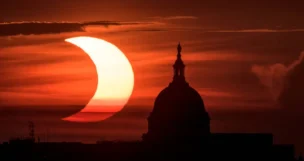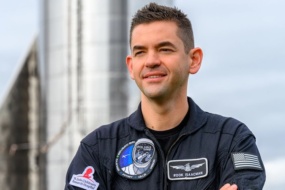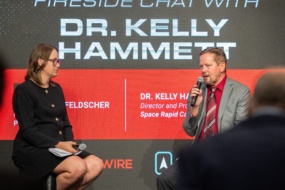What do Indian Prime Minister Narendra Modi, Brazilian President Luiz Inácio Lula da Silva, and Argentine President Alberto Fernández have in common? They all met with NASA Administrator Bill Nelson this summer.
Nelson is embracing—and elevating—his role as the nation’s space diplomat, and his long history on Capitol Hill means he doesn’t clam up when the conversation veers away from the cosmos.
“With my broad background in government, I’m fairly conversant with most of these subjects, so if it flows to discussing—[especially]…all over Latin America—the efforts of China, that’s something that I didn’t hesitate when it was brought up,” Nelson told Payload. “If it involved anything about Ukraine, I’m fairly conversant with that.”
Have passport, will travel
Administration officials who travel abroad typically meet with their foreign counterparts. But Nelson told us global excitement about space means he is often meeting with heads of state, including presidents, prime ministers, and kings, highlighting NASA’s soft power role in geopolitics.
So far this year, Nelson has already met with heads of state during trips to Japan, New Zealand, Canada, and Spain, in addition to meetings with top leaders from South Korea and India in DC. He recently got back to Washington after a tour through South America, which included meeting with top officials in Brazil, Argentina, and Colombia.
“Because of the popularity of NASA, it is the presidents of countries that want to see us as well. So on this last trip, President Lula of Brazil, I am told he does not accept many foreign visitors, he accepts the equal station of other heads of state,” Nelson said. “But he very graciously wanted to see us. That turned into an hour and a half meeting with him.”
Stories from the road
Nelson told stories of his meetings with international officials, from meeting with Spanish King Felipe VI, who is a pilot, to “hitting it off” with French President Emmanuel Macron.
“I was in Paris at some space conference and I get word that the president of France wants to see me. I have a very engaging conversation with him for an hour with a whole range of topics that he and I brought up, plus some laughs,” Nelson said. “Lo and behold, when [he] comes for the state visit with President Biden in Washington, where else does he want to go? He wants to go to NASA.”
Stories from home
Nelson also said he played a key role in the agreement reached with India in June to work together on human spaceflight, including training and launching an Indian astronaut to the ISS in 2024. After giving a space-focused presentation at the White House during Modi’s visit alongside Indian American NASA astronaut Sunita Williams, Nelson said Modi “warmly greeted” Williams.
“The prime minister is heading towards the two of us saying out loud, ‘I knew her father and he was a singer,’” Nelson said. “It turns out Sunni Williams…her father and Prime Minister Modi knew each other as young boys.”
What’s next
Nelson will travel to India late this year to continue hammering out details on the proposed cooperation. He will also travel to Dubai for his first visit to the annual Conference of the Parties on Climate Change (COP) at the end of November.




